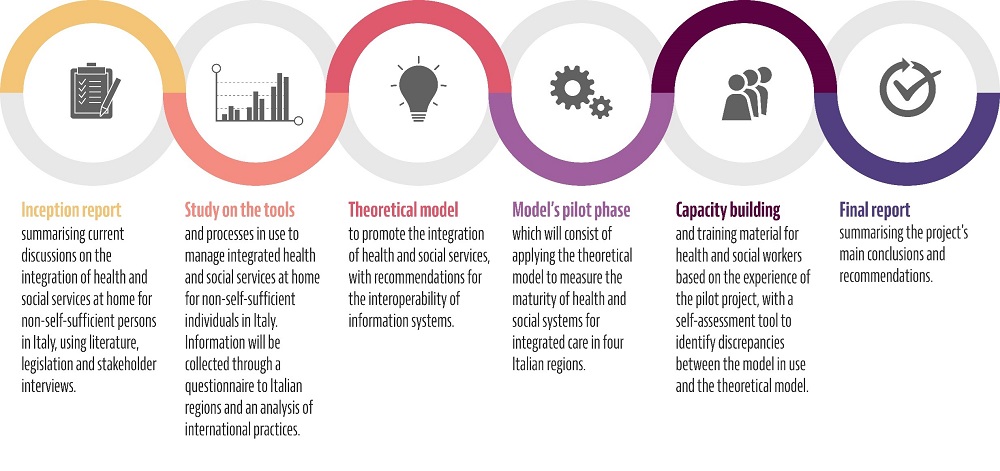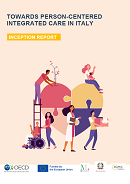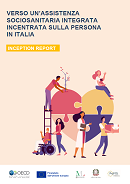Health
Towards person-centered integrated care in Italy
|
Italy is currently undergoing a reform process to strengthen integrated care at the community level to better address the health and social needs of non-self-sufficient people in Italy. The project “Towards person-centered integrated care in Italy” aims at supporting this reform process, leading to greater availability and better quality of health and social care services provided to non-self-sufficient at home. The project is implemented by the OECD Directorate for Employment, Labour and Social Affairs (ELS) and the OECD Trento Centre for Local Development, in cooperation with the Directorate-General for Structural Reform Support of the European Commission.
|
|
WHAT IS THE ISSUE ?
Over the past decades, Italian authorities have attempted to adopt an integrated care model, but successful initiatives were scattered and limited to a few areas. As a result, building on the competences in this matter attributed by the Italian system of delegated power, each region adopted its own approach, further contributing to large differences and disparities across the country.
To tackle this fragmentation and being able to provide an integrated care approach, the Italian Parliament adopted the Decree n. 77 of 23 May 2022, and the National plan for non-self-sufficiency. The former defines the models and standards for the development of territorial assistance in the National Health Service. The latter defines for the first time the Essential Levels of Social Benefits (LEPS) and establishes that home care, relief and support services must be guaranteed for elderly people who are not self-sufficient or have limited independence. Other key measures related to dependency include Law no. 227/2021 “Government delegation of powers on disability”, Law no. 33/2023 “Government mandate on policies supporting the elderly,” and the National Recovery and Resilience Plan approved by the European Commission on 22 April 2021. This plan outlines six missions, two of which are relevant for improving the integration of social and health services: mission 5 (cohesion and inclusion) and mission 6 (health).
- Download the project description in English and in Italian
KEY steps of the project ‘Towards person-centered integrated care in Italy’
The OECD foresees the development of the following outputs:

OUTPUTS - INCEPTION REPORTS
 |
Towards patient-centered integrated care in Italy - Inception report (Output 1) The aim of this inception report is to summarise the current situation and discussions in Italy on the integration of health and social services at home for dependent persons. Three sources were used for this. First, we reviewed the current scientific literature to evaluate the effect of policies promoting the integration of health and care services. Secondly, we analysed laws and guidelines at national, regional and autonomous province levels through a documentary study. Finally, to enhance the collected information, we conducted semi-structured interviews with a range of stakeholders. These included national and local authorities, institutions, civil society groups, trade unions, universities and research centres. |
 |
Verso un’assistenza sociosanitaria integrata incentrata sulla persona in Italia - Inception report (Output 1) L’obiettivo di questo rapporto introduttivo è di riassumere la situazione e le discussioni attualmente in corso in Italia sull'integrazione dei servizi sanitari e sociali a domicilio per le persone non autosufficienti. A tal fine sono state utilizzate tre fonti informative. In primo luogo, è stata effettuata una revisione della letteratura scientifica esistente per valutare l'impatto delle politiche volte a promuovere l’integrazione sociosanitaria. In secondo luogo, un'analisi documentale ha esplorato la normativa e le linee guida a livello nazionale, regionale e delle province autonome. Infine, per integrare le informazioni raccolte, sono state condotte interviste semi-strutturate con una varietà di stakeholder, tra cui autorità nazionali e locali, istituzioni, organizzazioni della società civile, università e centri di ricerca. |
FURTHER READING
- Learn about our work on Ageing and Long-term Care
- Read about Improving the disability assessment and social protection system in Italy
- Find out more about the OECD Trento Centre
- Health Statistics
- Health Policies
- Health Publications
CONTACTS
For more information, please contact:
- Mr Luca Lorenzoni, OECD Directorate for Employment, Labour and Social Affairs: luca.lorenzoni@oecd.org
- Ms Alessandra Proto, OECD Trento Centre for Local Development: alessandra.proto@oecd.org
- Reach the team at Integratedcare_Italy@oecd.org

Follow us on Twitter @OECD_Social

Related Documents
